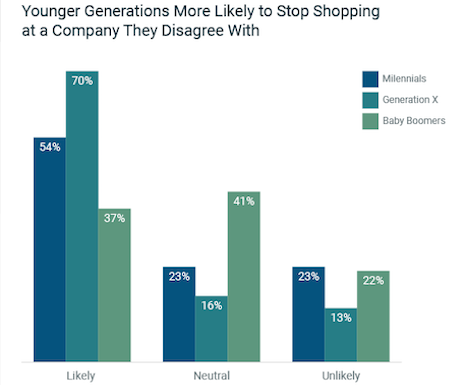Transparency around a brand’s corporate values is of increasing importance to consumers, particularly millennials and Generation Xers.
A new report from Clutch found that 71 percent of shoppers believe it is important for a company to take a side on social issues. Since a majority of respondents are likely to stop buying from a brand that supports an issue that goes against their personal values, companies must tread carefully.
Clutch surveyed 420 consumers in the United States for its report.
Values matter
A majority of respondents, 75 percent, are likely to shop a retailer or brand that supports like-minded issues.
Businesses can make their stances clear through their mission statements, business models, social media, advertising campaigns and other avenues.

Younger consumers expect businesses to share sustainability goals. Image credit: Moncler
Among the values most sought out by consumers is environmentally-friendly business practices, which is closely followed by supporting local communities and general social responsibility.
However, 71 percent of respondents want businesses to be vocal about a range issues, including more controversial topics such gun control, gender and politics.
Only 44 percent of consumers rated price or value as the most important attribute for a company.
According to Clutch, most respondents were willing to pay more for products or services from a socially-conscious brand – to an extent.
While publicly supporting particular issues can drive consumers toward a brand, the inverse is also true. Fifty-nine percent of respondents are likely to stop shopping a brand that supports an issue that is antithetical to their personal values.
Millennials often draw attention for their value-driven consumption (see story), but Clutch's survey found members of Generation X were the most likely to stop purchasing goods or services from brands they disagree with.
Seventy percent of Gen Xers, those between 35 and 54 years of age, would likely stop supporting companies whose social policies they oppose, compared to 54 percent of millennials between 18 and 34 years old. Only 37 percent of respondents over the age of 55 would be likely to avoid businesses in the same manner.

Baby Boomers are the least likely to reject companies for differing social values. Image credit: Clutch
Despite the impact brands' corporate values may have on consumers, respondents are divided on companies' primary motivations.
Twenty-nine percent of respondents believe brands are transparent about their values to earn more money, and 28 percent think businesses believe in the importance of expressing their support. Twenty percent of consumers are of the opinion that businesses want to attract certain customers.
Support for social responsibility
As younger consumers acquire more purchasing power, brands will need to be even more cognizant of how they approach social issues.
Luxury brands need to become more vocal and transparent about their sustainability efforts to meet consumer expectations, particularly as younger generations become greater forces in the business.
During panel discussions at Positive Luxury's Positive Week, executives from several high-end brands reiterated that sustainable practices will be non-negotiable for the up-and-coming Gen Z consumer. The sooner luxury companies, from the hospitality to retail sectors, start actively engaging with more environmentally-conscious affluents, the better for their businesses overall (see story).
Forward-thinking fashion labels are making sustainability part of their everyday routines and emphasizing transparency as well.
Sustainability is about more than responsibly-sourced materials and streamlined supply chains, and many companies have a social justice approach as well.
Many sustainable-oriented labels also partner with local and global organizations that support women's empowerment efforts. Labels are finding ways to support the marginalized communities that are risk of being first impacted by the climate crisis (see story).
{"ct":"HAUfPkiewsoJP4y1uzmu116+R\/x9RUoUAJIAcyU1FjKs+t9ZE9tDmUzmdmY4c6izDWZtOXzyMamazn7s6ydKoNGwyu1RA9G3qTjCuuvydicQp+H0PIsJjwKzgW0v7MXLVKv4FwTxaBjX3+FHIqjkJ0Syl\/DkCdhutFmafoVG3hP4Ct7ZOZSyq8vNEx8vM8FpBgPL6KAtYJMzmh8nLM6apWSvqKYYWkflECzfX1KKoe1eKKnwprWkkbXVFMh9PvqMrw++D\/R4\/e\/EhwNTwvSGXwAb6L4PcRJRldxtF1WMsbpyf\/mF0vwcYtncjH4b1lR45gUqy7qJ5Zw+Aevr58vxyuOImcKNGsw129tCXp2\/7+letk\/UbkATGxcfq\/IE99Be740QFx97VjZvqTJ\/QhUmv4ioBiYrWi825ejWf54pCQuZ8zS+7RZxSik8FDhUWQIiFLENQ8HZoC3km39dzD9ilc5F1+Ocu7VDE0VKetdlVXm63cXTJQh5L4Mu3CpYV4cX41UI\/N0gz140xLkTEZg6knLDmXnyO8zDk8z8iTN0gDL+\/PEjOgIgYQqNfD+8KTPqfoi2Z\/ubuXgPoD\/Nn3RPzqp+pLxKeSdAvIILl\/EHq\/dgucGeKzuFPxdly9D2OdcQ952IONXmBxucPZIZFe0Mrv5ooDZ59CAkjcDIrtOAx\/p+QFN094Yat98LhJT6P0whAcuFCqO+SKuZe3qDE3I4RiP00ZVf3Dp8QcsgfJDri2EMMYMPC4SUeefFKj2R4e9\/TKJxXo+Q4Kv1eMGlf21UDCVtBNmfrGUU4uVU1SRVTJCt5ehL9ZvECLKMc4MHDD57AYHSyCPmieAfp8GUVqFO2b4rwA5EGs5G\/QqgyLF2HawvJ09YbS\/WwAUz61cCYf0+s3g3TDzD9UXX5jY+I3ofCRPOAuKGudvHXo9jBNy33OTca1umw9WlhgEIrmRYxG175rSgHbPpHxBZpcyRNl9WnqwYw+s8INeEqWBS0wi5tEqELC4mdM4HnkkSlraNQ0utxussiJp31WJwn5s1qMcu9guB0dtjJy9kAtU2ZqYbUJRG0RAVs\/qnDJ9eObRG77PL5VOWyS33T32KevoB7Kj5U3lKrN3niPrv6HlAZi7Psj\/Z2kSCepxZ29hcbYR8GwBW2P4KvuTzkxPvOvE8GdOvE\/11pG6lRwLwCCmoenC8fgKwh\/FxRzOQSXXO7tIDypxxwII5xN15hYFdgVh+rwnca4SA1hxQsKleLpZ2eDtVwvB1hLf7ZVT617pfrY8\/io+e3rYsdiJ+NMRSXQjHsGi+5e8v5fiHhh93ZCOgomxFGh+qOSaxdXwgCKSM27c3VDoNNlOXrYlzAGZXEXhPRpcdNElf6UBwQTEC4\/Iqlhxou0Rmhm+lgYfdxvsBhApcdhWxco+tGlEjTPEEOdV9bYYVKJsLx5urvJjJKUAph0W4NefmykhcUspWVYA5abyNWbLuzf4CriyLZ7XgCRKrn7MblxZJ+5sXhZNUZGhb5eTsCI578sAUGvxs7phkkOaDjI4TKkv2cAWw5\/o7iXs\/Ek0P2G\/IMMdLHF2ZdUTPRO6msPK2N0GxjhSDpFAuz9OUo0Gxzag+qGqgS4AjwdgBaeXtriacwJUtoEqUhZLuv33QPXTPLqRnAxBsScTAsWTTH1Tlpfr9qUa0xF12ZesvBsrGmU0HqyRIBmFve3HGfK7Q12zv65OHgnt61omz5KIaPT60we2NGz0reYewczH1tSlXpEXLxMP5l0GX8AwJ9G2ALkXv5DX6\/KUH1DTcf0Pk5nuDcOhTheJXZs2+U+4pw9F50nQ7uzUh6ty3F2+g91xOc0kH9Vd0dlJkwViWuKvgncGl5hDgr7zzb40HyBF2uRzcp0VzctfUvuO\/36wu0\/qxh+XtYQkKIHg5r4JGVVSAOeIJd0FVr3BBk2nshChz7XADVCOhMfDKeICLKij4iGFDrWAFtZfV1u2nX3E1AgEWdLE1dFRr6QbeYCDHWoTBidQcigL+YV6HIUpMDBtGJt9U4zi+lvyeVWYxKctXQ4YsT\/4fA1vwOt2ZgzKbpoX5LaFzgYhRjr93tjLk8Z7uq2RP5NrOkQJF2amMPyemAtIXZo16dqZK3njZvXhghuAxmAR4O728ak+0yaklrwEyFBfaOFqdxIKmB3rX5KOS4h5m4RU3Ga4K\/sJfAiY+aEEWNhNh1LAelBvvTMYmSBt5PE91veDNat1NLEIFMOdooiaM3UDvy2ivQk6DLcz6uHMXIb+aZue9+tZORHGavqy5VclGJbhrTHZ6IcFn6+t35FV+yGZcNhY9\/gBUdr9H5LHXsl8g6h9uzTMrAjRVLSmQ\/Y5Yc7hm62lG6iSDnA1U2bkAVbqDlHgheg3w5k2NgpgTp1QwGEuxlwPSJ5qo19XIPFP1cSrrakwVDhyDhAvjN8NjLNN+edlI8HeArsSfDoDESalcX2FQ+uheA2VfaVsGc6w9Odk2bpqn6xKR7XTeIbUTB0H0uBcGO1t2A\/L2HppusZ3zCN3JgfOQzRn2fs4WRLyfG78Ohmn6IPFsxvCBi4mhbKDZb1iJLMjLs\/U1\/F0a6dgiYTDaq7\/K3X7pT\/ogZeRu\/y6YNgpRrAbAQskQEduYjEU80KZHIVHpVAGkUVbzHQgB17wiWb1eC8QvqNDQyAXxbR\/30EeNEdpf2doUDqovmtW4sYz8Cw0zWvc1cNUUSNgQRwPNIbPl7FBuBCSNLwpdrd3GUyBY2hLM0JPk5uObvjW90EYePnA7sgAhR2Ivb589myTqeOTy5pCssVNZl3ose7f3B4TyxaEmeNDyrZfvxBSNUf70VcUmg7eHYoLuVi9KXkX6l+WNL1OCfCVIB28TSyAQR0pBjRSjX41MKQF8a1ChF\/U+\/\/eUtT2J7DZJmkOpwIB5D1XbMJz3hHsdcy+v3vG0nanOYGgytRudcj7BFTPedouxOglMpeRsJG8lunEeCBx3aaqSFIfpRySH5rjv8CaAWqEfhTUqHa4SgoBCEdZ6IYsBq9HCZ6\/tt7vXl0N8Bo28xYTpuyJoSHffru5B8ULEW7bhkNjjirkfpHkL\/TyfR8tipPX8rTMvOOlDhiqQ7LT3mQ7fjrVLBc8Gdz\/YgcPer5W0SnMXOY\/u7CD3uJriiuPrSeq7QFtEoX0CovAV6xhSgQRzRJfZRg9rmnx4H9fvAJZZ7uSRHLWo6rXkAAn1MP1hHZvfLv96+7i1bv7SR23SBynbKxWlMrRGlaqpvtrXq7TlKvxK6BhCRn4cJtsU9b8DDvvS6PmXwRNGG9573fojGNLzdWrxT6MV9Pzq7aWMmNtSfH5UNk2gt7axMD3zGirUhh0Y08RlsVG2RxdChJ0NwUS2Dcmix+aOIXLUWzBaGc9tHHYfsUXnmlUiOAj\/387n0vhnd2284UnoUoIP296aWjixD5MvPcXb\/ajF6XAMAzDHBUYjJ1dJtHmgCVEFWrt38TtImtj7aH8wroCpLlpKa54jmgl96pLkdJ3SZgb2IH9EbnR0lakBLjLVUjka7F1mPPXxkFym3EWbmvfK0dIRVbwKZ\/nkHkIDYRe1M6v0tMPtgM6t62K2AMgGbvTedKxaBD4qzGPx3VFnnw9J9oQC5pBxz4efuAHRTc\/\/vroOzkxXiFJ4AWbgSlvoC2E20KNrMkUEXFHiOS6wHbBt6iX+JT5++KSzTHxteqkhBnIPtrazfidseo67KZZXPCDWqk7zqrcXR8FsGtzGfmZhgEuNJs9GXDsLZJSqsEWdTBv\/YBkym7USJAdJ2M6Qe3NvhYY6b2IfDMIjI583wEe\/LYVvBSul4FwNsoU+\/CvcWmEydMISA\/Pz9pkBtJ+xQgoJKkiHLbIoW8O4cLdf+o6WAWQ2IXTMSKB+ZVXumv5AoghyLwrkMMUKCm2E8SHTMe18nLmku4h2q0GPrzbIVZ1X30WwDYpEIwDTL3kMKooR3IiN+JLJouZ238uIYrg07N7jbW6mcI0Ol4nDSIDwxXUFUjNoxLuUvPFcwWaX1BCnzIQKrXpE1lts3jm2zDIxvrzPyOzQMBv4YmNJiPQRpa\/U7pkCHqIM2IkMwdiCx9KB2T3nfqBWPfYMxgV3KFKut15tTfpq1nSws0+PYjmlsHyVgTiQcwcwPAArWnFx6d3q1R6OJwewBRo4dqklCYTd03\/CMfxTQdbFaXD9HMuJpV9zHU\/ohmw+I4SM4dIBTBKE\/NztHJsM4zw6idCkHBt8bx9fcCoZwSOlea3Y3Vqh31dcbpnV5j4aH9aGqtWM9YwRd5TpvXCvkjRBO93G9yWFceo1t9HcOkQtMHe8lorvOVzZGET5GGEag1bTpGw\/g024dfMvgWx+A\/kebjXQryqfT7uS7c8Fm1plojN3H4LqcKzOvcx8PdNKAmlmO0LSWsFZlZJZxHIqpcjP7LgoKPz6oD1c0naHlvvC937\/zOP6899vYhTk17Lq\/h8JyIAGuf\/TeQfQPf80LuCJX7fMepoQuvfdnCIKBfq8LREPRZpw00xQ5enNCmbuH9SUrpZV\/aJRpUEzoSmcWUnoA9Aa\/lgR5w96Q2+ovuxRy7ckhB4AkmkkoARf51FYDWStS7zzlruH0oWFx9EUzi+b+Z6UP\/EEo0h7vZkN470IXYJj3Htcs2XFsPFFWKaqvKtuhrj1yD9eVEc6A90KOfVliAt9a7mMVxhqLVwZXuYcBmd8nPI5l+l6SUduK6Xx5gSTww8rCgblXYYPkw\/quQNmdVBc7UE75XBTl66vkqh5hs2UMfKNn3zMvwNTd9p2mlQ9HGPbnsgq5oGLUh2ArGV1c0q2fU4DnxUALI\/82sfaL7bTmlgvUHks83jXAssJ6z3GXqTXId79ZnOdwJQfENzQKTgPzJq1tqW6ZqX6DH88eAiWwNG4uaVlQHwJBVnoBP1+Iqvs2zXQEfZb8kDKGrxTqFUqR5\/fo1RJU5wCw54UTxZsl0u1\/JelMDO1fEZxwvnwoV1qx\/DwgmwKZFdGgbg496yGcH6ZEgDXtcIfdMrZQuEBSJ8ZaIAi2xfiD7qd+b4yBEQM8cAhHJL\/pAkzItG674sOsDlyNFgIxeUUBky7Qwtj8ZvYgeZWIGgnVrM6bi2sk98TMN6msPn3DdwME6uLdLf5prPYZKmcV+5kaSsAxfUkbOTz59ITRi7WB2Oz1+EjBKtKNXPQE3tXo9rZxyDhTkknHUfhx6YcGgtpMq+qf1jIyZUP\/9+Zv76urvWUaPKAOnMAuGBR1+uEa+kQRDzG\/dpcTnCXdiuU9YROznKJZ\/rP0TenG5eS6q8ZE9JUuNmAFV85A4xcEaxHV7\/TMF4alo66qZyKO4CxDbGPK6rB7K9CYF\/UrD8DXLZXRS+\/GHnoaJ95vaAx4RAokNI86QIPoqT9odRkxJ5IPvQ\/UKvGDyxX22LVhGExsI8Bib5lJKQ6+gEJMx1P0d3wPujqB6s22\/\/+eGQ94MvWHX0b7Fbd9LyX3IHRxx0QwLLabCh0eGDFdXS9+BDEwmr2tm\/kNLabLEz3jBSswSBdDueU7ixGxZPIuuW2zvhriaTfbLVSRZ4tzHsH8LJ\/aTBGPuyD1ck60lN3Vsq42fuis7JQnDBKcsxz3QAD27tWcNUk27nBfyubhixM4K4OI2WwwqsWrqYJkvjyKRLKLiF+jU6cHmOqfxDIx2D3SNwP\/XOFGgXxl24oqijY+JlYTnRxAGOgHU6W6DT5S87hHLybmoAI+3m5SW\/8plM+OLrgX5af1OxIooDGVKYkvb8DNOzdAyRl7hDISp8bnlLtlblkpZCD9baXAPOWkVijlhRwtEVaGFyZQAWrNK8q1MY2tl8zwDO+eUtK63jqKSoPMtEeURb6TMFdGD5BWiavopJtU8xUl8FifM7egZnsQrz+d2UaOIsoawm7+v569571PBo8rvYnt1wFUilwVr2DX9Fuy0SfiLV+22LjFugocJEtKOdHUkK\/WmEilwuz4ALlfZrIDUaCluX8bpdsu2y5NiAbW441pHrF3tDJnmWOlM\/oVFhgoO728GDyWWh8\/VxKot04DN6Zo1q5q\/MqalEYETvI8BTtErouVopwH076R7IntwaENK\/jmJBXSbh3BNfSP46dIFv7uNSr7bZVryA4sUZFhLXW6pG0cHuq7rOGtjDlS55xSPGb7CMLxc1\/AFdA\/wckdF6lgxaaPlcbGNZ6CSO+wDifkmV23Z2c1a24g7U+VFOCJHWdpflrnZqddlt4hUqgGOz1OV9fIpj6woueRZk771w1jszLT7M+httgzZJgyC0RZIhowFY73TeJg4QRP\/K8HjaGXOk2RAszcp0S2mdKGfK8vn0x3QaQlhXDAa2rmQmKlYHBSxMqwtmiaxSfsf8YJMum1MPgkbPCJyC3msliowNefD5NtovCsnLrW9v6sDyZSwpAQ2x7V4zu\/+\/pbV+etjdhFmJ+PIcMiamIcQg3reCTat06ghXRBrvroHGfec8pA6kyT\/WIb1KEc+TFhVbpjVb1\/lwhSsZXzZAcRgDttUZDadN72H7hOllIsXIzoPzOwaxZ\/OfnjTUBJ5Y7BGfhCl54RvqIRYs6Pkg5RDTIw1gTTMBL7wYFZZSRSfv3LGdUJjxtws\/5gbpWKtc2dGs6a\/iKlNcMpZqSX3rDR2YUuMMVAu8gKoEvgHIc3WBuzz6n0g+xCt77CuGOy6mCos2btagxZDz0M5HYR+MtPU+rZvamFlG9UgKKvZkKCuI5uDrrXKonslMkaUjesDR28qzIUaDlXikY0OoElO4QjWsetEAFqqbLdzEMbSRrITzjdDTCv9+ce++hOm\/v8w\/iBbdTSY9EehXvsFSxEtPcR6bHz7amQSx4qaCM6Dac3EL70qVaqnW8JgOv2Dv5QoK\/Or\/W1gPyWlwl7J0jBJJAcvSyPglcSqLJ5Z0AWPtHLPptNSSmgm2TWAt6wEGORbFqRluhWB+6xSCAGflB9LHG+MVIZ03H0nqV3ypcZC6ODYdl5h+pbfjsX1gYuyFJ9eKYScQ1UIi0Hg9RsfTsbjp3e8USriiZQw\/FC8XINb7xwKNchcvYu077x2DOxuo9YvVF5FBkrIAmnGraPBQA+J6omv\/PEIFUeQiNzx0YhekVlanYGw5FLAyqTfPMnsHaN0xtkDqxoMwrcw2jkRuHFVv05ZJqsZJYGjF9TB4rLc+iJKG1kRoyWRPn2rc\/Xqxy0yIYMTpIptuMW8uGXaWW4q4BU\/akklG0siGGvrtDP9kh\/kkukTZFny1ka7Bybb4U8tYwG+LWIa6IG922co60EXhEllfaFW5QpvRiFZoE5Zr0S463Yuu3dw8exUcuPQb572aPRFno9sjX295CFfOuhhaRsjohEY\/UDCg4ZQ4iYVYR9P6OlFW4\/ZH6BMG9S8O7kC0Sb2gAmckuad5uGIGN3elVHS4\/SQ==","iv":"66b227e3b181d2eacb5ba8552ed070a9","s":"b17085e16584d381"}

 Transparency is a growing concern for consumers. Image credit: Dior
Transparency is a growing concern for consumers. Image credit: Dior